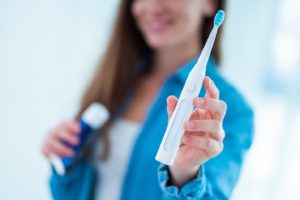 You want to choose the best oral hygiene products, but doing so can be confusing. Many manufacturers use flashy wording and attractive packaging to advertise their toothbrushes. Others have a simpler presentation, but that doesn’t mean they can’t be effective. Plus, there are so many options out there that it’s easy to just throw in the towel and pick up whatever toothbrush first catches your attention in the oral hygiene aisle at the grocery store. Before you get too overwhelmed, though, take a moment to read the following information. An experienced dentist is here to give you some practical guidance on how to answer the question, “What kind of toothbrush should I pick?”
You want to choose the best oral hygiene products, but doing so can be confusing. Many manufacturers use flashy wording and attractive packaging to advertise their toothbrushes. Others have a simpler presentation, but that doesn’t mean they can’t be effective. Plus, there are so many options out there that it’s easy to just throw in the towel and pick up whatever toothbrush first catches your attention in the oral hygiene aisle at the grocery store. Before you get too overwhelmed, though, take a moment to read the following information. An experienced dentist is here to give you some practical guidance on how to answer the question, “What kind of toothbrush should I pick?”
Bristles
Regardless of what other features a toothbrush might have, it is important that you choose one with soft bristles. Some people are under the mistaken impression that hard bristles do a better job of cleaning. That simply isn’t true. Not only do hard bristles not clean better, but they can also damage your enamel and cause serious damage to your gums. They can also scratch porcelain restorations, thus detracting from their beauty.
Size
The head of the toothbrush should be small enough to be maneuvered easily around your mouth. For most adults, a toothbrush head that’s half an inch wide and one inch long works very well. However, some have found that a smaller, round head is more comfortable to use and cleans the teeth better. The size of the handle is also something to consider. If you have arthritis in your hands or other mobility issues, it is important to choose a toothbrush that you can grip easily.
Electric or Manual
According to the American Dental Association, both electric and manual toothbrushes can be effective at preventing cavities. However, electric toothbrushes have a few notable advantages over their manual counterparts:
- Electric toothbrushes have been shown to remove more plaque than manual ones, particularly if the electric brush has a rotating head (as opposed to just a vibrating head).
- Electric toothbrushes are especially recommended for individuals who have mobility problems that might limit their ability to properly use a manual brush.
- Many electric toothbrushes feature a built-in timer that reminds you to brush long enough to adequately clean your teeth and gums.
Expert Recommendation
If you still aren’t sure which toothbrush is right for you, talk to a professional. Your dentist, or one of the hygienists in their office, may recommend a specific product that has worked well for other patients.
Your choice of toothbrush can have a significant effect on your oral health! Use the above guidance to pick a brush that will keep your smile fresh, clean, and thriving.
About the Author
Dr. Bryan Griffith is a dentist in Prestonsburg with over 25 years of experience in his field. He is passionate about preventive care, and he is always happy to share his knowledge with patients. If you would like to talk to Dr. Griffith about choosing the right oral hygiene products for you, contact our office at 606-874-9311.
